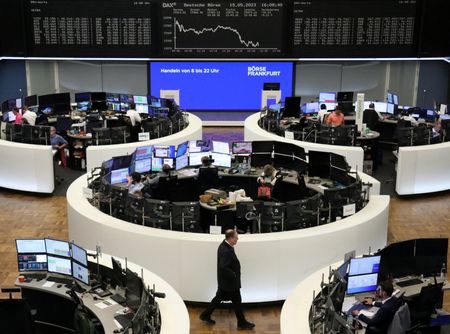 1
1 1
1


By Amanda Cooper
LONDON (Reuters) -Global shares edged up on Tuesday, while the dollar eased back from five-week highs as U.S. lawmakers prepared for another round of talks to resolve the deadlock over the government’s borrowing limit.
The weaker dollar supported crude oil and equities, although investors were wary of crucial U.S. government debt-ceiling negotiations, with a little more than two weeks to go before the government could run short of money to pay its bills.
Investors have dumped short-term U.S. Treasuries that mature around the “X date” – the point beyond which the government runs out of money to pay its bills without an increase in the borrowing limit.
Other than that, however, global markets are showing little evidence of stress, at least for now.
Michael Brown, a strategist at TraderX, said he believed there would eventually be an agreement, but the concessions President Joe Biden’s Democrats may have to make in order to strike a deal could come at a high cost to the U.S. economy.
“What I care about in terms of the debt ceiling, isn’t the ‘is it going to be raised, is it not going to be raised’ pantomime stuff,” he said.
“What happens next and what needs to happen to get something over the line and, once it’s done, whether the can is kicked or whether there’s a longer agreement, I think that will start to come into investors’ thinking a little bit more,” he said.
The MSCI All-World index was up 0.1%, while stocks in Europe were flat and U.S. index futures edged into positive territory.
There are signs that the global economy is starting to feel the pinch of rising interest rates and persistent inflation.
China saw industrial output rise in April but by far less than economists had expected, while retail sales also fell short of forecasts – highlighting the fragility of the post-COVID recovery. The offshore yuan fell 0.2% on the day against the dollar.
Against the yen, the dollar fell 0.23% to 135.78. The euro rose 0.2% to $1.0893.
Sluggish manufacturing data from New York State on Monday raised concerns about a slowing U.S. economy that could help bring down inflation, which would strengthen the case for the Federal Reserve to stop raising rates.
Benchmark 10-year notes fell 3 basis points to 3.47% on Tuesday. Yields on the one-month bill hit another record high above 5.8%.
In commodities, Brent crude rose 0.7% to $75.76 a barrel, while U.S. crude rose 0.66% to $71.60.
(Additional reporting by Selena Li in Hong Kong; Editing by Muralikumar Anantharaman and Ed Osmond)